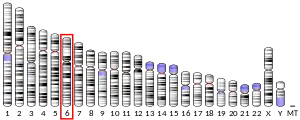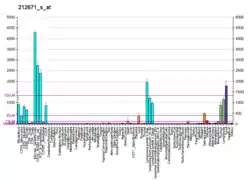HLA-DQA2
HLA class II histocompatibility antigen, DQ(6) alpha chain is a protein that in humans is encoded by the HLA-DQA2 gene. Also known as HLA-DXA or DAAP-381D23.2, it is part of the human leucocyte antigen system.[3]
The protein encoded by this gene is expressed, but unlike HLA-DQA1, it apparently unable to heterodimerize with HLA class II beta chain paralogues.[4] The low level of HLA-DQA2 expression is apparently due to impaired transcription factor binding to the HLA-DQA2 gene promoter.[5]
References
- ENSG00000206301, ENSG00000257473, ENSG00000231526, ENSG00000225103, ENSG00000237541, ENSG00000223793, ENSG00000233192 GRCh38: Ensembl release 89: ENSG00000231823, ENSG00000206301, ENSG00000257473, ENSG00000231526, ENSG00000225103, ENSG00000237541, ENSG00000223793, ENSG00000233192 - Ensembl, May 2017
- "Human PubMed Reference:". National Center for Biotechnology Information, U.S. National Library of Medicine.
- "Entrez Gene: HLA-DQA2 major histocompatibility complex, class II, DQ alpha 2".
- Rudy GB, Lew AM (March 1997). "The nonpolymorphic MHC class II isotype, HLA-DQA2, is expressed on the surface of B lymphoblastoid cells". J. Immunol. 158 (5): 2116–25. PMID 9036956.
- Indovina P, Megiorni F, Fontemaggi G, Coni P, Mora B, Mazzilli MC (May 2001). "Absence of in vivo DNA-protein interactions in the DQA2 and DQB2 promoter regions". Hum. Immunol. 62 (5): 504–8. doi:10.1016/S0198-8859(01)00236-1. PMID 11334674.
Further reading
- Marsh SG, Bodmer JG (1993). "HLA class II nucleotide sequences, 1992". Tissue Antigens. 40 (5): 229–43. doi:10.1111/j.1399-0039.1992.tb02050.x. PMID 1362295.
- Kenter M, Otting N, Anholts J, et al. (1992). "Evolutionary relationships among the primate Mhc-DQA1 and DQA2 alleles". Immunogenetics. 36 (2): 71–8. doi:10.1007/BF00215282. PMID 1612647. S2CID 43642526.
- Piatier-Tonneau D, Gastinel LN, Amblard F, et al. (1991). "Interaction of CD4 with HLA class II antigens and HIV gp120". Immunogenetics. 34 (2): 121–8. doi:10.1007/BF00211424. PMID 1869305. S2CID 10116507.
- Rosenstein Y, Burakoff SJ, Herrmann SH (1990). "HIV-gp120 can block CD4-class II MHC-mediated adhesion". J. Immunol. 144 (2): 526–31. PMID 1967269.
- Bowman MR, MacFerrin KD, Schreiber SL, Burakoff SJ (1991). "Identification and structural analysis of residues in the V1 region of CD4 involved in interaction with human immunodeficiency virus envelope glycoprotein gp120 and class II major histocompatibility complex molecules". Proc. Natl. Acad. Sci. U.S.A. 87 (22): 9052–6. doi:10.1073/pnas.87.22.9052. PMC 55099. PMID 1978941.
- Gyllensten UB, Erlich HA (1990). "Ancient roots for polymorphism at the HLA-DQ alpha locus in primates". Proc. Natl. Acad. Sci. U.S.A. 86 (24): 9986–90. doi:10.1073/pnas.86.24.9986. PMC 298627. PMID 2513578.
- Clayton LK, Sieh M, Pious DA, Reinherz EL (1989). "Identification of human CD4 residues affecting class II MHC versus HIV-1 gp120 binding". Nature. 339 (6225): 548–51. Bibcode:1989Natur.339..548C. doi:10.1038/339548a0. PMID 2543930. S2CID 4246781.
- Diamond DC, Sleckman BP, Gregory T, et al. (1988). "Inhibition of CD4+ T cell function by the HIV envelope protein, gp120". J. Immunol. 141 (11): 3715–7. PMID 2846691.
- Jonsson AK, Hyldig-Nielsen JJ, Servenius B, et al. (1987). "Class II genes of the human major histocompatibility complex. Comparisons of the DQ and DX alpha and beta genes". J. Biol. Chem. 262 (18): 8767–77. PMID 3036828.
- Horn GT, Bugawan TL, Long CM, et al. (1988). "Sequence analysis of HLA class II genes from insulin-dependent diabetic individuals". Hum. Immunol. 21 (4): 249–63. doi:10.1016/0198-8859(88)90034-1. PMID 3372263.
- Andrieu JM, Even P, Venet A (1986). "AIDS and related syndromes as a viral-induced autoimmune disease of the immune system: an anti-MHC II disorder. Therapeutic implications". AIDS Research. 2 (3): 163–74. doi:10.1089/aid.1.1986.2.163. PMID 3489470.
- Auffray C, Lillie JW, Korman AJ, et al. (1987). "Structure and expression of HLA-DQ alpha and -DX alpha genes: interallelic alternate splicing of the HLA-DQ alpha gene and functional splicing of the HLA-DQ alpha gene using a retroviral vector". Immunogenetics. 26 (1–2): 63–73. doi:10.1007/bf00345456. PMID 3610256. S2CID 19758795.
- Trowsdale J, Lee J, Carey J, et al. (1983). "Sequences related to HLA-DR alpha chain on human chromosome 6: restriction enzyme polymorphism detected with DC alpha chain probes". Proc. Natl. Acad. Sci. U.S.A. 80 (7): 1972–6. Bibcode:1983PNAS...80.1972T. doi:10.1073/pnas.80.7.1972. PMC 393734. PMID 6300884.
- Auffray C, Lillie JW, Arnot D, et al. (1984). "Isotypic and allotypic variation of human class II histocompatibility antigen alpha-chain genes". Nature. 308 (5957): 327–33. Bibcode:1984Natur.308..327A. doi:10.1038/308327a0. PMID 6584734. S2CID 4358124.
- Houlgatte R, Scarmato P, el Marhomy S, et al. (1994). "HLA class II antigens and the HIV envelope glycoprotein gp120 bind to the same face of CD4". J. Immunol. 152 (9): 4475–88. PMID 7512597.
- Chirmule N, McCloskey TW, Hu R, et al. (1995). "HIV gp120 inhibits T cell activation by interfering with expression of costimulatory molecules CD40 ligand and CD80 (B71)". J. Immunol. 155 (2): 917–24. PMID 7541827.
- Rowell JF, Stanhope PE, Siliciano RF (1995). "Endocytosis of endogenously synthesized HIV-1 envelope protein. Mechanism and role in processing for association with class II MHC". J. Immunol. 155 (1): 473–88. PMID 7602119.
- Rudy G, Lew AM (1994). "Limited polymorphism of the HLA-DQA2 promoter and identification of a variant octamer". Hum. Immunol. 39 (3): 225–9. doi:10.1016/0198-8859(94)90264-X. PMID 8026991.
- Chen YH, Böck G, Vornhagen R, et al. (1994). "HIV-1 gp41 binding proteins and antibodies to gp41 could inhibit enhancement of human Raji cell MHC class I and II expression by gp41". Mol. Immunol. 31 (13): 977–82. doi:10.1016/0161-5890(94)90092-2. PMID 8084338.
- Chirmule N, Wang XP, Hu R, et al. (1994). "Envelope glycoproteins of HIV-1 interfere with T-cell-dependent B cell differentiation: role of CD4-MHC class II interaction in the effector phase of T cell help". Cell. Immunol. 155 (1): 169–82. doi:10.1006/cimm.1994.1110. PMID 8168144.
This article is issued from Wikipedia. The text is licensed under Creative Commons - Attribution - Sharealike. Additional terms may apply for the media files.



